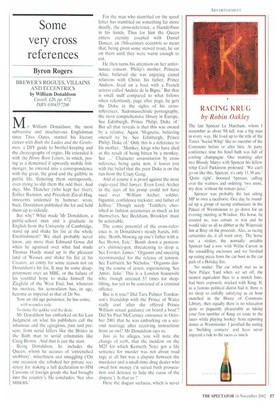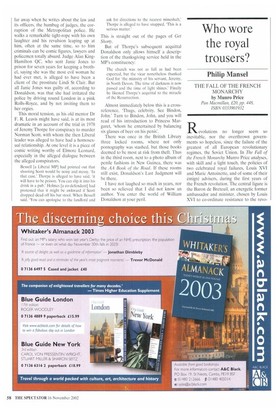Some very cross references
Byron Rogers
BREWER'S ROGUES, VILLAINS AND ECCENTRICS by William Donaldson Cassell, £20, pp. 672, ISBN 0304357286 Mr William Donaldson, the most subversive and mischievous Englishman since Titus Oates, started his literary career with Both the Ladies and the Gentlemen, a DIY guide to brothel-keeping and the choreography of orgies. He extended it with the Henry Roof Letters, in which, posing as a demented if upwardly mobile fishmonger. he entered into a correspondence with the great, the good and the gullible in public life, flattering them outrageously, even trying to slip them the odd fiver. And they, Mrs Thatcher (who kept her fiver), Esther Rantzen, and President Zia-al-Haq, innocents undented by humour, wrote back. Donaldson published the lot and held them up to ridicule.
But why? What made Mr Donaldson, a public-school man and a graduate in English from the University of Cambridge, stand up and shake his fist at the whole Establishment? We shall probably never know, any more than Edmund Gosse did when he agonised over what had made Thomas Hardy stand up in the pleasant land of Wessex and shake his fist at his Creator, an entity for some reason not on Donaldson's hit list. It may be some disappointment over an MBE, or the failure of his youthful hope to make himself the Ziegfeld of the West End, but, whatever his motives, his iconoclasm has, in age, become as imperial as that of Dr No.
Now an old age pensioner, he has come, with wolindes rede To deme the quikke and the dede.
Mr Donaldson has embarked on his Last Judgment on what his publishers call the infamous and the egregious, past and present. from serial killers like the Brides in the Bath man to serial columnists like Craig Brown. And that is just the start.
Being Donaldson, he includes the Queen, whom he accuses of 'entrenched snobbery', miserliness and smuggling (`On one occasion she rebuked her private secretary for making a full declaration to HM Customs of foreign goods she had brought into the country'). He concludes, 'See also MISERS.'
For the man who stumbled on the spoof letter has stumbled on something far more deadly, the cross-reference, a blunderbuss in his hands. Thus for him the Queen enters eternity coupled with Daniel Dancer, an 18th-century eccentric so mean that, being given some stewed trout, he sat on them until they were warm enough to eat.
He then turns his attention on her unfortunate consort. 'Philip's mother, Princess Alice, believed she was enjoying carnal relations with Christ; his father, Prince Andrew, lived on a boat with a French actress called Andree de la Bigne.' But that is small stuff compared to what follows when relentlessly, page after page, he gets the Duke in the sights of his crossreferences. 'Sadomasochistic pornography, the most comprehensive library in Europe. See Edinburgh, Prince Philip, Duke of.' But all that reveals is that this was owned by a relative. Again 'Magnetic, believing oneself to be, See Edinburgh, Prince Philip, Duke of.' Only this is a reference to his mother. 'Monkey, kings who have died as the result of being bitten by a monkey, See ...' Character assassination by cross reference being quite new, it leaves you with the belief that the poor Duke is on the run from the Crazy Gang.
And of course it is proof against the most eagle-eyed libel lawyer. Even Lord Archer in the days of his pomp could not have sued over 'William Archer, soldier, bigamist, confidence trickster, and father of Jeffrey.' Though surely 'Toddlers, cherished as fashion accessories as much as for themselves, See Beckham, Brooklyn' must be actionable.
The comic potential of the cross-reference is, in Donaidson's steady hands, infinite. 'Bomb, blowing up one's father with a. See Brown, Eric.' Bomb down a pensioner's chimney-pot, threatening to drop a. See Forster, James.' Orgasms and sneezing recommended for the release of tension. See Fairbairn, Sir Nicholas.' Orgasms during the course of arrest, experiencing. See Amiri, Julie.' This is a London housewife who, though arrested 53 times for shoplifting, has yet to be convicted of a criminal offence.
But is it true? Did Tara Palmer Tomkinson's friendship with the Prince of Wales really cool 'after she offered Prince William sexual guidance on board a boat'? Did Sir Paul McCartney announce in October 2001 that he was embarking on a second marriage after receiving instructions from an owl? Mr Donaldson says so.
Just as he alleges, you will note the change of verb, that the incident on the M25 for which Kenneth Noye got a life sentence for murder was not about road rage at all but was a dispute between the murderer and a small-time drug dealer who owed him money Olt suited both prosecution and defence to hide the cause of the dispute). Is that so ?
Here the disgust surfaces, which is never far away when he writes about the law and its officers, the humbug of judges, the corruption of the Metropolitan police. He walks a remarkable tight-rope with his own laughter and his revulsion leaping up at him, often at the same time, so to him criminals can be comic figures, lawyers and policemen totally absurd, Judge Alan KingHamilton QC, who sent Janie Jones to prison for seven years for keeping a brothel, saying she was the most evil woman he had ever met, is alleged to have been a client of the prostitute Lindi St Clair. But all Janie Jones was guilty of, according to Donaldson, was that she had irritated the police by driving round London in a pink Rolls-Royce, and by not inviting them to her orgies.
This moral tension, as his old mentor Dr F. R. Leavis might have said, is at its most dramatic in an account of the trial in 1978 of Jeremy Thorpe for conspiracy to murder Norman Scott, with whom the then Liberal leader was alleged to have had a homosexual relationship. At one level it is a piece of comic writing worthy of Elmore Leonard, especially in the alleged dialogue between the alleged conspirators.
Besse [a Liberal MP] had pointed out that shooting Scott would be noisy and messy. 'In that case.' Thorpe is alleged to have said, it will have to be poison. You can slip it into his drink in a pub.' Holmes [a co-defendant] had protested that it might be awkward if Scott dropped dead off his bar stool. When Besse11 said, 'You can apologise to the landlord and ask for directions to the nearest mineshaft,' Thorpe is alleged to have snapped. 'This is a serious matter.'
This is straight out of the pages of Get Shorty.
But of Thorpe's subsequent acquittal Donaldson only allows himself a description of the thanksgiving service held in the MP's constituency:
The church was not as full as had been expected, but the vicar nonetheless thanked God for 'the ministry of his servant, Jeremy, in North Devon. The time of darkness is now passed and the time of light shines.' Finally he likened Thorpe's acquittal to the miracle of the Resurrection.
Almost immediately below this is a crossreference, 'Thugs, celebrity. See Bindon, John.' Turn to Bindon, John, and you will read of his introduction to Princess Margaret, 'whom he entertained by balancing six glasses of beer on his penis'.
There was once in the British Library three locked rooms, where not only pornography was stashed, but those books deemed to be most at risk from theft. Thus in the third room, next to a photo album of penile fashions in New Guinea, there was the AA Book of the Road, If these rooms still exist. Donaldson's Last Judgment will be there.
I have not laughed so much in years, nor been so relieved that I did not know an author. You enter the world of William Donaldson at your peril.



























































































 Previous page
Previous page